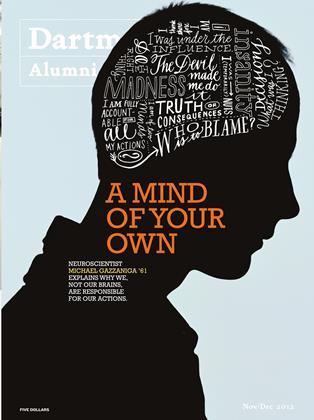Dartmouth athletes are having their heads examined. Voluntarily, of course. Earlier this year Dr. Thomas McAllister '75, DMS '78, undertook a study of the cognitive effects of head impacts on members of the football, hockey, track, crew and Nordic skiing teams by administering tests before and after their seasons. The results? Twenty-two percent of the athletes who play contact sports posted lower results in learning and memory skills after their seasons, compared to just 4 percent of the non-contact sport athletes. "This raises the question of whether there may be a subgroup of athletes whose recurring head impacts may have an affect on their memory and learning," says McAllister, who played hockey briefly as an undergrad. "It's a pretty nuanced set of results, and it's unknown how long the effects of head impacts may last." There were some correlations between test results and how often and how hard the athletes were hitting their heads, notes McAllister, referring to contact at practices and in actual games. Participating athletes also came from teams at Brown and Virginia Tech. For the next part of the study, McAllister will analyze MRI scans of the athletes' brains.
 View Full Issue
View Full Issue
More From This Issue
-
 Cover Story
Cover StoryIs Your Brain to Blame?
November | December 2012 By Irene M. Wielawski -
 Feature
FeatureGoing Global
November | December 2012 By Emily Unger ’11 -
 Feature
FeatureROBERTA STEWART
November | December 2012 -
 Feature
FeatureRYAN HICKOX
November | December 2012 -
 Feature
FeatureAIMEE BAHNG
November | December 2012 -
 Feature
FeatureANGELA PARKER
November | December 2012
Article
-
 Article
ArticleDARTMOUTH COLLEGE MEMORIAL FIELD FUND CONTRIBUTORS BY CLASSES
August, 1926 -
 Article
ArticleAlumni Reunions
December 1945 -
 Article
ArticleNot a Simple Farmer
SEPTEMBER 1998 By Bill Scherman '34 -
 Article
ArticleHALLS OF NAME
Sept/Oct 2007 By C.J. Hughes ’92 -
 Article
ArticleJUNIORS
November 1950 By Peter B. Martin '51 -
 Article
ArticleCincinnati
February 1960 By THOMAS W. WILSON JR. '53


